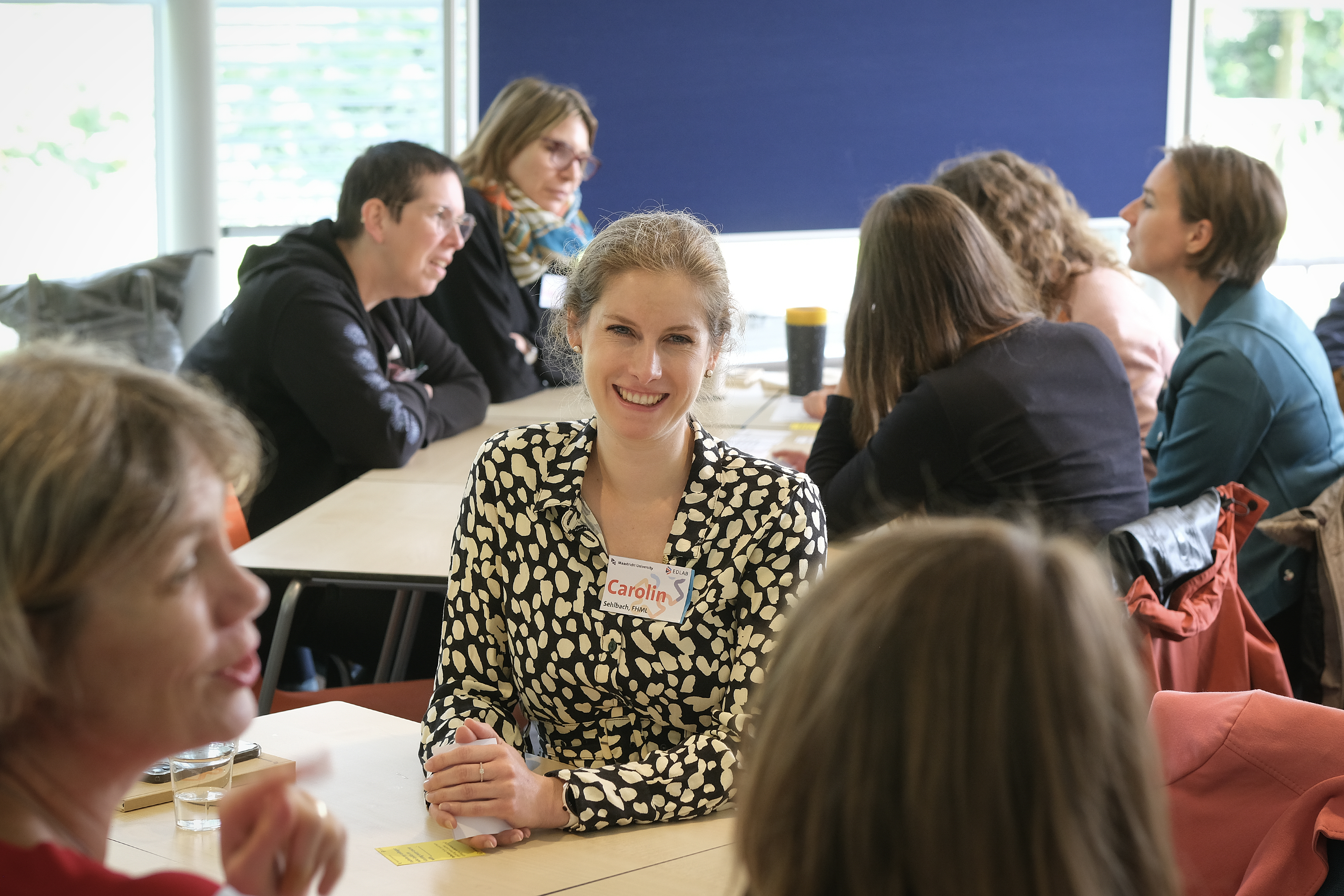Carolin Sehlbach’s research examines feedback as a tool for growth in education
“I hope to show people how to view evaluations not as a tick-box exercise, but as an opportunity for meaningful reflection and growth,” says Carolin Sehlbach, an Assistant Professor in the Department of Educational Research and Development at the Maastricht University Faculty of Health, Medicine and Life Sciences.
Sehlbach studies how feedback shapes education, focusing on making it a two-way conversation between students and teachers, or teachers and educational leadership. As part of the FHML programme evaluation task force, she applies her research to improve teaching practice and enhance educational quality.
In her EDLAB fellowship research project, she examines how Maastricht University teachers can use evaluation data to guide their Continuing Professional Development. She values being part of an institution with a strong tradition in educational research. “It’s a great place to build on this history and contribute to it,” she says. “In education research, theory and practice really enrich each other.”
Connecting health and education
Selbach’s interest in feedback began during her PhD, when she realised that healthcare and education share many similarities. "Is research in health profession education so different from research in higher education?” she asks. Both fields rely on learning from experience and open conversations to improve outcomes. Moving from health sciences to education research, she saw how meaningful feedback plays a key role in driving engagement and enhancing results in both clinical and educational practice.
She also saw how different factors shape educational quality. “How we engage in dialogue and we define education quality depends on so many factors: social, cultural, and psychological influences all play a role,” she says. When done right, feedback is more than an assessment – it creates conversations that lead to real progress.
Rethinking feedback in the classroom
Selhbach wants to shift the way student evaluations are used. Instead of treating them as merely data points, she encourages educators to see them as tools for growth.
She makes a key distinction: evaluation, feedback, and dialogue. Evaluations are often structured assessments such as surveys or reviews, while feedback involves an interactive reflection that can lead to improvement. Dialogue is what makes feedback meaningful and continuous. Without it, feedback becomes one-sided and less effective.
By using student evaluations for real discussions, she hopes to help teachers and students grow together.

Power dynamics in feedback
Selhbach studies how, for instance, students give feedback to teachers, as those in authority, which she defines as “upward feedback”. “This dynamic can be quite challenging, as it disrupts traditional hierarchies,” she says. “But upward feedback can be incredibly useful, whether from students or patients, as it fosters collaboration and drives improvement in both education and patient-centred care.”
For junior tutors, this is even more complex. Because they are close in age to their students, balancing authority and peer relationships can make feedback difficult. Inexperienced tutors may struggle with criticism, while students may hesitate to be honest.
Selhbach’s research explores how feedback can go beyond evaluating past performance to actively shape and improve future teaching practices. She aims to create a culture where feedback is a shared learning process rather than a top-down evaluation.
Creating a culture of constructive feedback
Selhbach believes learning happens best in a supportive community. Her team runs focus groups with tutors and educators to see how feedback shapes self-perception and growth. “Feedback can either align with a tutor’s self-image, reinforcing their confidence, or confront them with unexpected perspectives that can be harder to accept but rich with learning potential,” she says.
To keep feedback constructive, her team at FHML removes harmful or discriminatory comments from evaluations. They also run peer-to-peer coaching sessions, where tutors discuss their feedback in structured or informal settings, like over coffee with colleagues.
Sehlbach sees structured reflection as key to helping tutors develop their skills and adapt to changing classroom dynamics. “Learning happens through practice and from practice,” she says.
Shaping the future of evaluation in education
Sehlbach wants to change how evaluation is used in education, making student evaluations tools for reflection and improvement rather than just an administrative task. By promoting open discussions and providing structured support, she integrates feedback into professional growth.
Through focus groups, coaching, and research, she works to embed evaluations in a broader conversation about teaching and learning. Her message is clear: feedback isn’t just about assessment; it’s about dialogue, collaboration, and continuous growth
Text by EDLAB student-assistant Spoorti Ramesh, bachelor's student (FPN)
Also read
-
Study Smart gets Dutch Education Premium
Maastricht University's (UM) interfaculty educational innovation project Study Smart is one of the three winners of the Dutch Education Premium 2025. This was announced on Tuesday during the Comenius festival in The Hague.
